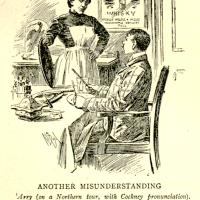 Avid C.S. Lewis readers will know that he is more than any one of his profiles—the Narnian, an apologist for everyday folk, a controversialist, and the like. I have been working for some time to help readers avoid narrowing their field of vision. Certainly, Lewis was an apologist, but if we look at everything he wrote as if he is writing apologetics, we are going to miss much of the beauty, nuance, and imaginative invitation in his work.
Avid C.S. Lewis readers will know that he is more than any one of his profiles—the Narnian, an apologist for everyday folk, a controversialist, and the like. I have been working for some time to help readers avoid narrowing their field of vision. Certainly, Lewis was an apologist, but if we look at everything he wrote as if he is writing apologetics, we are going to miss much of the beauty, nuance, and imaginative invitation in his work.
Thus, I was pleased to see Alan Snyder and Jamin Metcalf move beyond the most common cardboard images of Lewis to seriously consider his work as a literary historian–which, indeed, is his greatest contribution to literary studies. Going one step deeper, Many Times & Many Places: C.S. Lewis and the Value of History applies the particular lens historians use to survey his work as a whole.
Because Snyder and Metcalf are able to avoid limiting their vision to Lewis as a fantasist, apologist, or cultural critic, they are able to bring fresh insight into the historical instincts in his life and writings. With clarity of purpose and an uncluttered approach to the question, Snyder and Metcalf enlighten aspects of Lewis’ vocation as a literary historian. This new study reveals how Lewis avoided ideological traps and was thus able to discern meaning in history. We are also invited to think about the deep cultural-historical roots of Lewis’ imaginative fiction.
 On Lewis’ fiction, I would be intrigued to know what Snyder and Metcalf might produce if they wrote a series of short argumentative essays rather than a survey. After all, their unique approach is not simply an historical point of view much needed in C.S. Lewis studies. They are, by their own argument, historians who live within their own particular times and places. I would also like to see Snyder and Metcalf press in at a deeper level on how the Incarnation of Christ becomes a hingepoint in history. Tinidril, the goddess of Perelandra, views the Incarnation in history as the turn of a corner or a wave that, once it has come, makes everything after it different. Is this aspect of Lewis’ historical imagination central to a distinctively Christian view of history, or part of a complex of ideas? I am hungry to think about this more.
On Lewis’ fiction, I would be intrigued to know what Snyder and Metcalf might produce if they wrote a series of short argumentative essays rather than a survey. After all, their unique approach is not simply an historical point of view much needed in C.S. Lewis studies. They are, by their own argument, historians who live within their own particular times and places. I would also like to see Snyder and Metcalf press in at a deeper level on how the Incarnation of Christ becomes a hingepoint in history. Tinidril, the goddess of Perelandra, views the Incarnation in history as the turn of a corner or a wave that, once it has come, makes everything after it different. Is this aspect of Lewis’ historical imagination central to a distinctively Christian view of history, or part of a complex of ideas? I am hungry to think about this more.
Fortunately, Snyder and Metcalf provide an accessible foundation for historical study, some tools to begin, and space to ask more questions. Beyond a general appreciation for the approach and this book as a resource, we must be especially grateful for one particular aspect of their work. In Many Times and Many Places, we get a rare glimpse of Lewis’ genius for being able to bridge the divide between different times and places without annihilating the unique cultural diversity of historical and literary moments as they provide a prophetic voice and aesthetic grandeur to our world.
 Many Times & Many Places: C.S. Lewis and the Value of History is available through Winged Lion Press, available now.
Many Times & Many Places: C.S. Lewis and the Value of History is available through Winged Lion Press, available now.
See more at Alan Snyder’s blog, Pondering Principles.






















Thank you for this note. This new book seems a valuable study and resource. I have read Lewis’ apologetics and fiction, and only recently got a first experience of him as a literary historian, when I read his book, “A Preface to Paradise Lost.” In that book he talks about many epic poems going back to Homer’s time, and it’s always clear that he knows these works and their contexts as one who has studied them for a lifetime. He also shows something else you mention, an ability to bridge the divide between historical moments while honestly keeping their distinctiveness.
Thanks for the note, Kevin. A Preface to Paradise Lost is pretty punchy, and it is in that book where he is fighting against those who eradicate the divide in two ways: 1) reading is about finding a universal feeling across culture (Lewis denies it exists and values the local, indigenous arts); and 2) the poet and the poet’s culture is irrelevant to reading, for even as words and images change in form and meaning, what is critical is how I respond to the text (Lewis thought that effectively eradicated the text itself, making it a mirror for the reader’s perspective). He was going in the middle way, so he’s fighting against other things too, but these two points have encouraged me.
The first thing I ever read by Lewis was THE ALLEGORY OF LOVE. It gave me a lifelong interest in medieval literature, even though some of its views on courtly love are now considered obsolete.
Oh, that’s a lovely tale! I wonder if the folks who rethought the history of courtly love didn’t go a bit far…. I had a teacher say, “Although there was no real courtly love tradition, the stories are valuable for X, Y, and Z.” Seems a bit absolute to me.
I love CS Lewis. A Brilliant writer. Thank you for your exceptional cross reference review.
Awesome! I hope you enjoy!
bd